




 |
   |
 |
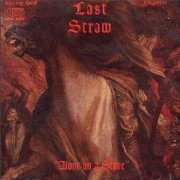 |
Alone on a Stone (2001, recorded 1973-76, 54.41) ***/½TerenceLife Without Rules Alone on a Stone Fools When August Breaks Fly Mirage Kings Return Theme From Chance |
Current availability:
Mellotron used:
Last Straw hailed from that very un-rock'n'roll outpost, the Isle of Wight, off the south coast of England, renowned for being about twenty years behind the mainland at any given time. Kissing Spell have seen fit to exhume nearly an hour of the band's demos from the early '70s and give them a release as Alone on a Stone, although, unsurprisingly, the sound quality is rather inconsistent. Sadly, the quality of the music is also somewhat variable; there are some excellent moments, but, all too often, the band jammed songs out to eight or nine minutes for no especially good reason. Best tracks? Probably the first two or three, before the full-on sub-Wishbone Ash guitar work kicks in.
Keyboards on some tracks; these were recorded at several different sessions over a course of three or four years and I doubt if the band's lineup remained consistent. I think the strings on Life Without Rules and the title track are a string synth of some description, but it's definitely Mellotron on Terence, played by musician unknown. You get a couple of string chords and a couple of choir chords and that's it for the album, so don't go spending loads of money on this for the Mellotron.
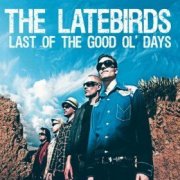 |
Last of the Good Ol' Days (2010, 53.15) ***½/TT |
|
| Last of the Good Ol' Days Among the Survivors Time to Live Summer Becomes Fall Time Revisited Fearless Like Father Like Son No. 1 |
Kickin' Me You Cynical You Underwater Last of the Good Ol' Days (reprise) Light at the End of the Tunnel |
|
Current availability:
Mellotron/Chamberlin used:
Given that Norway and Sweden have both thrown up very acceptable Americana/roots rock-type outfits, it should come as no surprise to hear that Finland have entered the fray with The Latebirds. Their third album, 2010's Last of the Good Ol' Days, is a potent blast of Tom Petty-esque Americana with a punk attitude, shifting between the slow-burn opening title track through Time To Live's rock'n'roll, the summery pop of Summer Becomes Fall and the menacing Fearless (the lyrics tackle the murder of Russian journalist Ana Politkovskaja). The album's organic feel is due to most of its contents being tracked in one sitting, with surprisingly little overdubbing, a skill almost forgotten these days, it seems.
Matti Pitsinki plays Mellotron flutes on Like Father Like Son and No. 1, while Petty's Benmont Tench adds Chamberlin strings to Summer Becomes Fall and Light At The End Of The Tunnel, with a solo part at the end of the former. All in all, then, a minor triumph of the kind that should get The Latebirds played on 'alt.rock' stations across the States, where absolutely no-one would have any idea they weren't listening to an American band.
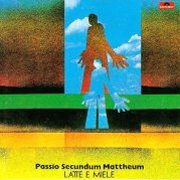 |
Passio Secundum Mattheum (1972, 34.42) ***½/T½ |
|
| Introduzione Il Giornio Degli Azzimi Ultima Cena Getzemani Il Processo I Testimoni (1° parte) I Testimoni (2° parte) Il Pianto |
Giuda Il Re Dei Giudei Il Calvario Il Dono Della Vita |
|
Current availability:
Mellotron used:
Latte e Miele's (Milk and Honey) debut album, Passio Secundum Mattheum, is probably also their best, featuring all the invention that we've come to expect from Italian progressive of that era. It appears to be a concept work, several pieces being by Bach, lyrics apparently taken from the gospels, which figures, given the title. It veers wildly between styles in places, keeping the listener guessing as to what they'd do next (Il Pianto to Giuda is a particularly striking contrast), but without ever moving so far as to lose sight of their core sound. As with so many progressive albums, this will probably take several plays to appreciate properly, so in one playing it's difficult to pick out highlights, although the churchy Hammond on Il Calvario stands out.
Oliviero Lacagnina's Mellotron takes a bit of a back seat to his Solina, which provides all the string parts; as a result, the Mellotron seems to be (very unusually) used almost entirely for brass parts, of all things. I wasn't entirely sure that's what I was hearing until Getzemani, where a 'stabby' part reveals the sound's source, at which point I had to go back to see if I'd missed any on earlier tracks. The only other Mellotron I can hear is a polyphonic flute part on Il Dono Della Vita, despite drummer Alfio Vitanza's credit for flute. The choir, incidentally, appears to be real.
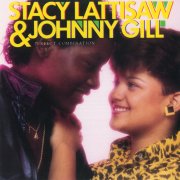 |
Perfect Combination (1984, 37.09) **/½Block PartyFun'n'Games Falling in Love Again 50/50 Love Perfect Combination Heartbreak Look Baby it's You Come Out of the Shadows |
Current availability:
Mellotron used:
Stacy Lattisaw's career began at the outrageous age of twelve, in 1979, making her all of seventeen when her sixth release, 1984's Perfect Combination (with Johnny Gill), appeared. Produced by Narada Michael Walden, it shifts between several then-popular r'n'b styles, including electro (opener Block Party, 50/50 Love), funk/pop (Fun'n'Games, Heartbreak Look) and 'trad' soul balladry (Falling In Love Again, the title track). Amusingly, some of the synth work reminds me in places of fab Canadian mega-pompsters Saga, although the comparison always falls flat on its face within a few bars.
Frank Martin adds occasional background Mellotron choirs to Falling In Love Again, to no great effect, to be honest. I suppose '80s soul/funk fans may go for this, but I can't see it exciting anyone else, including anyone who might wish to hear a little recorded Mellotron.
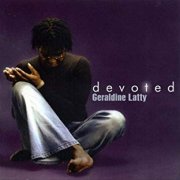 |
Devoted (2003, 41.58) **/T |
|
| O Lord Our God (You Are Good) It is By Your Mighty Power Take My Life and Let it Be Lord I Come All I am Wash Me and Cleanse Me (Psalm 51) We Will Proclaim How Matchless is Your Love |
Lead Us Heavenly Father Lifting My Eyes (Holy God) |
|
Current availability:
Mellotron used:
Cheshire-born London resident Geraldine Latty is a gospel/'worship' singer, whose second release, 2003's Devoted, is, in many ways, a typical CCM album, although, somehow, she avoids the genre's worst elements. I wouldn't take that as any kind of recommendation, mind, but I've heard a lot worse in this area. A lot worse.
Phil Madeira plays 'Mellatron' (the name's screen-printed onto the control panel, whoever wrote the sleevenotes), with chordal flute parts on We Will Proclaim and Lead Us Heavenly Father. I'd actually like to be able to give this a higher rating, as Geraldine strikes me as far more genuine than most of her contemporaries, but its high gloop-to-music ratio has prevented me.
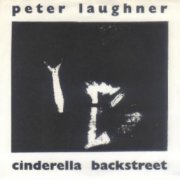 |
7" ( 1987, recorded 1973) ***½/½ Cinderella Backstreet White Light/White Heat |
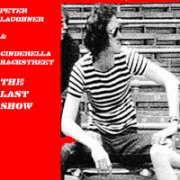 |
The Last Show (200?, recorded 1973, 66.26) ***/TTTSister Ray (Practice)Sweet Jane Rock and Roll All Along the Watchtower Heroin White Light/White Heat |
Current availability:
Mellotron used:
Lou Reed fanatic Peter Laughner is one of those 'legendary' figures whose actual output is remarkably sparse; in this case, Laughner played in Cleveland's iconic Rocket From the Tombs, some of whose members went on to form the Dead Boys and Pere Ubu (Laughner played on the latter outfit's early singles), before dying in 1977 of drug-related causes, aged all of twenty-four. He hardly ever entered a recording studio, so his legacy, such as it is, largely consists of live bootlegs and murky rehearsal tapes, which didn't stop Forced Exposure mag releasing a Laughner single in 1987, pairing one of his rare studio recordings, Cinderella Backstreet, with a version of the Velvet Underground's White Light/White Heat from a live tape, confusingly credited to Cinderella Backstreet, Laughner's band at the time.
Cinderella Backstreet (the song) is actually a really rather good vocal/acoustic number that would easily slot into a compilation of junkies' laments, available on Laughner's only CD release, Tim/Kerr's 1993 now out-of-print disc Take the Guitar Player for a Ride, while White Light/White Heat is as endearingly ramshackle as you'd expect, a skronky Mellotron string line appearing some way into the song. As it turns out, the gig from which this track was excerpted has actually been released in its own right, admittedly as a CD-R-only semi-bootleg from Handsome Productions, The Last Show, credited to Peter Laughner & Cinderella Backstreet.
If you're not into the Velvets, it probably isn't the easiest listen ever, particularly (very) low-fi opener Sister Ray, taken from a rehearsal tape, although the actual gig is at least listenable. Mostly Velvets covers, the band also tackle All Along The Watchtower, dedicating it to Hendrix (a mere three years dead at the time), although it has more in common with Dylan's original recording. Co-vocalist Cindy Black doubles on Mellotron, string parts running through Rock And Roll, All Along The Watchtower (with a major solo part in the middle) and Heroin, plus the aforementioned brief part on White Light/White Heat, making this almost certainly the only time you'll hear a Mellotron used on Velvets songs. It has to be said that much of Black's playing consists of no more than the root note repeated ad infinitum, shifting up an down an octave as the tapes run out, although she definitely redeems herself with that Watchtower part.
Do you buy this? Depends how badly you want to hear Velvets songs played by an acolyte, badly recorded, with extra added Mellotron. The Last Show isn't a bad album, but unless you're really into this stuff, the endless versions of Lou and Co's songs are, well, endless. Nice Mellotron solo on Watchtower, though.
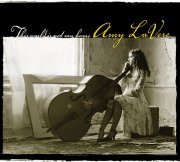 |
This World is Not My Home (2005, 35.21) ***/T |
|
| Day Like Any Nightingale Leaving Never Been Sadder Innocent Girl Take 'Em or Leave 'Em Last Night |
Set it Down This World is Not My Home We Went Sailing |
|
Current availability:
Mellotron used:
Amy LaVere's debut album, 2005's This World is Not My Home, straddles the folk/country divide slightly uncomfortably, tending to veer between the styles, rather than blending them in the manner of possibly her greatest forebear, Johnny Cash. It's not a bad album, but highlights like opener Day Like Any or Never Been Sadder are often overshadowed by the rather ordinary country numbers that litter the record.
Paul Taylor's credited with various things, including Mellotron, which finally appears on Set It Down (although it's supposed to be on Nightingale, too), with strings wobbly enough to be real, making a nice change.
See: Samples etc.
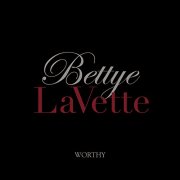 |
Worthy (2015, 44.05) ***½/T |
|
| Unbelievable When I Was a Young Girl Bless Us All Stop Undamned Complicated Where a Life Goes |
Just Between You and Me and the Wall You're a Fool Wait Step Away Worthy |
|
Current availability:
Chamberlin used:
Bettye Lavette should be a household name, but, despite working with the likes of Otis Redding and James Brown in her youth, a run of bad luck in the '70s (thanks, Atlantic Records) diverted her career into stage shows the following decade. She was in her late fifties by the time she was rediscovered in the early 2000s, since when she's enjoyed a late-career renaissance and, going by 2015's Worthy, not before time. A gritty, heartfelt soul/blues record of the old school, it contains material of the quality of opener Unbelievable, a dirty blues takes on Dylan's song, the upbeat Complicated, the lengthy, traditional blues in three-time, Just Between You And Me And The Wall You're A Fool and the acoustic Wait.
Patrick Warren does his increasingly-rare Chamberlin thing here; despite the high-speed run in the song, that has to be Chamby strings on When I Was A Young Girl and string swells on Bless Us All, although that would appear to be it. This will by no means appeal to my 'usual' readers, but it's an excellent album within its genre.
 |
Under My Skin (2004, 40.52) **½/½ |
|
| Take Me Away Together Don't Tell Me He Wasn't How Does it Feel My Happy Ending Nobody's Home Forgotten |
Who Knows Fall to Pieces Freak Out Slipped Away |
|
Current availability:
Chamberlin used:
Avril Lavigne is known mainly (to me, at least) for her irritating worldwide hit, Sk8er Boi (aaargh!) and appears to have two major, multi-million selling albums to her credit. She seems to align her self with 'punk', but is reported to have never heard of the Sex Pistols, or heard the Ramones, making her claims more than a little suspect, although, in fairness, she was born in 1984, making it all relatively ancient history to her. She's romantically linked to a member of Sum 41, a thoroughly faceless so-called 'punk' outfit, completely interchangeable with Blink 182, or any other current band with a number in their name. Above all else, she reminds me of her awful countrywoman Alanis Morissette, although I'm aware that's a lazy comparison. Tough.
Under My Skin is unlikely to appeal to many people over the age of twenty, so it was a foregone conclusion I'd hate it. If it had even the tiniest sliver of originality, or just vaguely attempted to sound like nothing else, rather than everything, I might be able to cope with it. As it is, it's a thoroughly professional record, with no obvious redeeming features whatsoever, although I don't feel justified in giving it an even lower star rating. As for the 'punk' bit, half the tracks are piano ballads; not something I recall hearing from the Ramones or the Pistols. Patrick Warren plays Chamberlin on it, but all I can hear is cellos (assuming they're Chamby) on Fall To Pieces and Slipped Away, although some of the album's string parts could possibly be tape-replay, too.
 |
Your Star Was Shining (2009, 40.35) ***/T |
|
| Swandive Pretend You Don't See Me Rocket Sue Nightmare Blues Ms. Yugoslavia Olivia Black Venus Queen of the Forest |
Angela Priest Here's to Absent Friends |
|
Current availability:
Mellotron used:
The three core members of L'Avventura met while busking in London (as you do), forming Niagara after their return to the States. Niagara morphed into L'Avventura, whose debut, 2009's Your Star Was Shining, features an indie take on 'classic' pop songwriting, at its best on opener Swandive, the affecting Rocket Sue and Angela Priest.
Matt Henry Cunitz plays Mellotron, with background strings on Rocket Sue and more upfront ones on Olivia, although the strings on Queen Of The Forest are real, while the flutes on Angela Priest don't have that 'Mellotronness' about them.
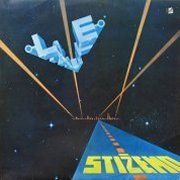 |
Stižemo (1978, 35.07) ***½/½Noč u PakluKo Sam Ja? Intro-Mental Poslije Svega Top Hit Lista Ljubav |
Current availability:
Mellotron used:
Laza i Ipe were keyboard player Laza Ristovski and drummer Goran Ipe Ivandic, both ex-Bijelo Dugme, who made just the one album together, Stižemo, with the help of various friends. Recorded in London, it's a late example of symphonic progressive and could easily have been made three or four years earlier; that's a compliment, by the way. Vlatko Stefanovski's guitar work is pretty ripping and Ivandic's sister Gordana provides a fair chunk of the vocals, along with Goran Kovacevic; in fact, the musicianship's excellent all round - particular praise must be given for Ristovski's keyboard work. There's quite a bit of variety on the album - maybe too much; the heads-down boogie of Top Hit Lista is entirely unnecessary, although given its title, it's quite possible it's meant to be a joke. The rest of the material veers between the balladic Ljubav and the almost Who-like Noč U Paklu, most tracks erring on the side of the quiet as against the loud, making Top Hit Lista that much more of an anomaly.
Most of Ristovski's keyboard work is standard Hammond, piano and synth, with string synth on Ko Sam Ja?, although he gets some Mellotron in on one track, the mid-paced Poslije Svega, with a string part behind the build-up in the middle of the song. Once again, you're not going to find this too easily, but, for the dedicated collector, it's actually worth the effort, although I don't hear too much local influence on the music, sadly. Incidentally, Ristovski also played Mellotron on a mid-'80s solo album, Roses for a General and two Smak albums from around 1980.
See: Laza Ristovski | Smak
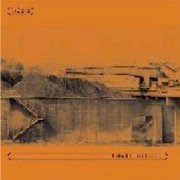 |
Le Notti Difficili (2003, 44.54) ***/T½SolitudiniIl Babau Il Sogno Della Scala Equivalenza |
Current availability:
Mellotron used:
LaZona are the latest Fabio Zuffanti (Finisterre, Hostsonaten, La Maschera di Cera, Zuffanti/Heward) side-project, whose sole album to date, Le Notti Difficili, is best described as post-rock, marking a distinct change in approach from his usual symphonic progressive stylings. But is it any good? Matter of opinion, I suppose; as someone who doesn't hear this kind of stuff too often, it neither excites nor utterly bores me, although it probably tends more towards the latter. Long, drifting tracks of mild instrumental dissonance, with trombone interjections, sounds like it's tailor-made for the prog fan, but the reality is rather less interesting, sadly, although I'm sure it conforms to the 'rules' laid down by Mogwai, Godspeed You! Black Emperor and the like. Basically, I'd have thought that if you like the style, you'll probably like this. Conversely...
Zuffanti sidekick Agostino Macor plays Mellotron on Il Sogno Della Scala and Equivalenza, largely consisting of multiple repetitions of basic string chord sequences, serving mainly to give us an idea of how Godspeed et al. might sound if they used a Mellotron. This really isn't the most exciting use you'll ever hear, but then, nor is it the most exciting music you'll ever hear, either, so it's fairly fitting. To sum up; this is post-rock, not prog and the Mellotron use isn't exactly innovative. Up to you, really.
See: Finisterre | Hostsonaten | La Maschera di Cera | Fabio Zuffanti | Zuffanti/Heward
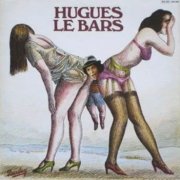 |
Hugues Le Bars (1981, 30.18) ***/TT |
|
| Tirez Avec Misogyne Manigance J'Me Languis J'Vois Pas Pourquoi Oh! Où il est le Temps Est-Ce le Mec Ma P'tite Lina |
Elle est Assise sur le Tapis J'Voudrais Etre Mieux La Fille de la Plage |
|
Current availability:
Mellotron used:
Hugues Le Bars (1950-2014) seems to be known more as a film music composer than as a solo artist, although he released several albums that don't appear to have any soundtrack connection. His eponymous debut is probably best described as being at the eccentric end of the chanson spectrum, notably on the highly theatrical Ma P'tite Lina, featuring frantic acoustic and electric guitar work, not to mention his unique take on scat singing.
Le Bars plays Mellotron on five tracks, with background strings on Oh! Où Il Est Le Temps, Elle Est Assise Sur Le Tapis and closer La Fille De La Plage, chordal choirs on Est-Ce Le Mec and an arranged string part, including a radical pitchbend, on J'Voudrais Etre Mieux. Hugues Le Bars is perfectly good at what it does, but I can't imagine it'll be of much interest to anyone other than fans of French singer-songwriters, while its Mellotron use is nothing out of the ordinary.
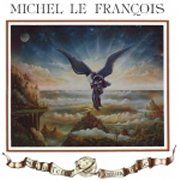 |
Sur la Terre Comme au Ciel (1979, 41.10) ***/TTTChevaliers de l'UniversÊtre Avec Vous Jardin de Crystal Sur la Terre Comme au Ciel L'Étranger Traverser la Nuit Entre Ciel et Terre |
Current availability:
Mellotron used:
Michel le François seemingly only released one album before the '90s, 1979's Sur la Terre Comme au Ciel, which comes across as a bit of a stylistic mish-mash, to be honest. It starts well enough, with Chevaliers De L'Univers, which reminded me of Starcastle, oddly enough, which must mean it sounds quite a bit like Yes, I suppose. Être Avec Vous, however, is a fairly sloppy love song sung by a female vocalist, before the album swings back to prog, then proto-AOR, balladry, hard rock... It doesn't seem to be able to decide what it wants to be; diversity's fine, but this doesn't even sound like the same band half the time, but then I suppose that's often the nature of solo projects.
Anyway, there's a fair bit of Mellotron on the album, five out of seven tracks smothered in strings and choir, although little of the use stands out as exceptional, to be honest. So; a reasonable Mellotron album, but a bit ropey on the musical front, only two tracks (Chevaliers De L'Univers and Jardin De Crystal) really counting as 'progressive'. Don't spend a fortune.
See: Paul-André | Éternité | Claude Léveillée
Led Zeppelin (UK) see: |
 |
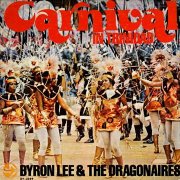 |
Carnival in Trinidad (1974, 30.30) ***/TT |
|
| Vero Miss Mary Jericho Sprach Zarathustra 2001 My Connie Bassman I Come Out to Play San Fernando Carnival |
Priest Rain-o-Rama |
|
Current availability:
Mellotron used:
Unbelievably, Byron Lee (1935-2008) & the Dragonaires formed in 1950, although it took them the better part of a decade to release a record. Throughout their lengthy career, they have released albums in a bewildering variety of styles, including R&B, calypso, ska, reggae, soca and other Caribbean genres, which makes them either opportunists or canny, working musicians in the old 'entertainment' tradition, rather than the more recent 'artistic' one; fair enough, we all have to make a living. 1974's Carnival in Trinidad is pretty much what you'd expect; mostly instrumental Caribbean carnival music, with nary a trace of reggae to be heard, its chief downside being the constant and irritating cowbell-whacking heard throughout, although it's a minor quibble. Highlight? Possibly Sprach Zarathustra 2001, which is, as you might've guessed, a carnival rendering of Richard Strauss' finest few minutes, although the brass section struggles with the semitone shifts they're asked to produce, leading to something of a tuning issue across the section.
Neville Hinds adds all kinds of instrumental colouring, including (of course) a Mellotron, with cello, flute and string parts on Jericho, strings on Bassman and Come Out To Play and flutes on San Fernando Carnival, all depping for more expensive real ones, of course. If you're not into Caribbean carnival music, you really aren't going to like this, frankly, although it seems to be excellent at what it does. Sadly, Lee died of cancer in 2008, although his band have continued his good work as Byron Lee's Dragonaires.
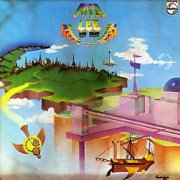 |
Atras do Porto Tem Uma Cidade (1974, 29.46) ***½/TT½ |
|
| De Pés No Chão Yo No Creo Pero Tratos à Bola Menino Bonito Pé de Meia Mamãe Natureza Ando Jururu Eclipse do Cometa |
Círculo Vicisio Tem Uma Cidade |
|
Current availability:
Mellotron used:
Rita Lee was, of course, vocalist with acclaimed Tropicalia outfit Os Mutantes, although she'd moved on before their sole Mellotron album, 1973's oAeoZ. Atras do Porto Tem Uma Cidade was her third solo effort, featuring a mixture of styles, the funky pop of opener De Pés No Chão contrasting sharply with the rock'n'roll of Tratos à Bola or the brief, heavy instrumental Tem Uma Cidade.
The album's up to the minute gearwise, with a heavy Clavinet presence and a good helping of Hammond and Moog, plus the obvious. Lee herself plays Mellotron strings on the album, with a part drifting in and out of Yo No Creo Pero, some great volume-pedalled chords on Mamãe Natureza and more background work under real flute on Ando Jururu and on Círculo Vicisio, although the strings on Menino Bonito are real.
See: Samples etc. | Os Mutantes